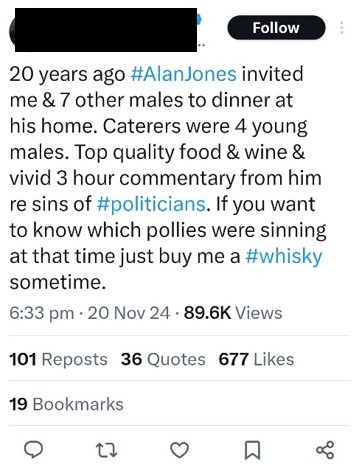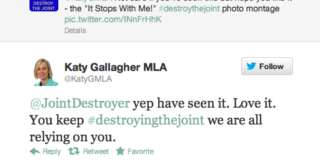The past week in politics and media has been curious. The Disinformation Bill was ditched by Labor, the Online Safety Amendment Bill (Age 16 Social Media Ban) received bipartisan support and Alan Jones, the crusty old-kingmaker, was charged with historical child sex offences. Every person is deserving of a defence – it’s a core tenet of our legal system. It is not the place of any person to judge a matter that is before the courts, it is however our place to consider the behaviour of others in the days following the revelation of charges against an accused.
Anyone who has faced criminal charges knows that your friends are few. It’s a rare person with the courage to pursue a seminal issue who is supported by those who once called themselves his friends through the interminable months and years as they fight a prosecution. Just as Bakchos or David McBride.
So it was with some consternation that I read this post on X (formerly Twitter) last week.

I was stunned. The abandonment of friendship evidenced in the post is typical of the many who have distanced themselves from the accused, but more concerning is both the admission of the company he kept and the fact that he is willing to slander others (for a suitable inducement). It speaks poorly of the character of anyone to gossip – for that is what it is – rather than to engage in the legal process to ensure that justice can be delivered for those who have been truly harmed.
It’s terribly easy to distance yourself from someone facing accusations, be they legitimate or not. It is far easier to join the hordes so as to not become attacked yourself. This is the essence of mobbing and it is the reason we are advised to keep our opinions about an accused to ourselves whilst the legal processes are in motion. The ACT’s Indigenous former Commissioner for Revenue was mobbed, the subject of malicious attacks by a racist team member who was allowed to run amok by Executives who were all too aware of the racism at the heart of the matters.
Statements of fact matter far more than salacious and bigoted gossip. What we say about others in public matters as well. Those statements, be they hearsay or fact, reflect upon the speaker and the company they keep far more than upon their subject. Gossip, as insubstantial as a dirty soap bubble, will burst at the slightest touch and leave the finger just as slimy. That’s what has happened to all those who piled on the former Commissioner for ACT Revenue, who participated in the fit-up of Bakchos conceived in 2013 and defeated when he won 16-0 in the ACT Supreme Court in 2017.
People who will turn their backs on human rights abuses playing out right in front of them, who are too gutless to speak out to protect a victim, who side with the pack for opportunity’s sake. The company you keep says a lot about you. Character is not built upon who you know, it is evidenced in how you behave. We are what we do and say. Take a good hard look at those who gossip and ask yourself – what do they gain from their loose lips? Are they serving others or themselves? What is their motivation? There’s always a pay-off sought by a gossip. It’s always about power and it’s never about you.
Always remember to ask yourself – how does the gossip know the information? Can I be assured that it is truthful? Why are they telling me? Are my motivations for spreading gossip valid? Invariably, the responses are negative and will save you from substantial stress later. More importantly, they will save others from potential actual and mental harm.
Choose who your name is associated with carefully, for it may become the hill upon which you are remembered.
The tweet concerned remains up at the time of publishing and the writer has subsequently asserted no regret for its content. A subsequent tweet has attempted, unsuccessfully some argue, to put the original in a more favourable light.

